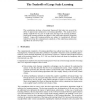Free Online Productivity Tools
i2Speak
i2Symbol
i2OCR
iTex2Img
iWeb2Print
iWeb2Shot
i2Type
iPdf2Split
iPdf2Merge
i2Bopomofo
i2Arabic
i2Style
i2Image
i2PDF
iLatex2Rtf
Sci2ools
137
click to vote
NIPS
2007
2007
The Tradeoffs of Large Scale Learning
This contribution develops a theoretical framework that takes into account the effect of approximate optimization on learning algorithms. The analysis shows distinct tradeoffs for the case of small-scale and large-scale learning problems. Small-scale learning problems are subject to the usual approximation–estimation tradeoff. Large-scale learning problems are subject to a qualitatively different tradeoff involving the computational complexity of the underlying optimization algorithms in non-trivial ways. 1 Motivation The computational complexity of learning algorithms has seldom been taken into account by the learning theory. Valiant [1] states that a problem is “learnable” when there exists a probably approximatively correct learning algorithm with polynomial complexity. Whereas much progress has been made on the statistical aspect (e.g., [2, 3, 4]), very little has been told about the complexity side of this proposal (e.g., [5].) Computational complexity becomes the limiting ...
Information Technology | Large-scale Learning Problems | Learning Algorithms | Learning Problems | NIPS 2007 |
Related Content
| Added | 30 Oct 2010 |
| Updated | 30 Oct 2010 |
| Type | Conference |
| Year | 2007 |
| Where | NIPS |
| Authors | Léon Bottou, Olivier Bousquet |
Comments (0)

